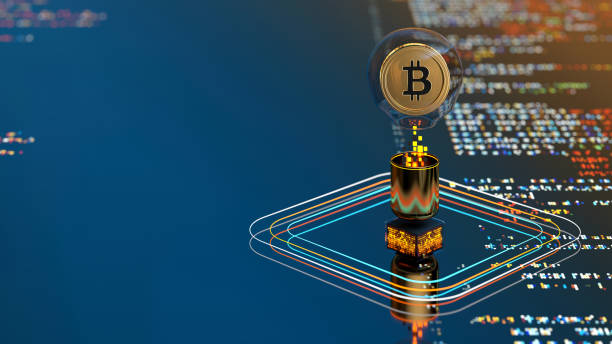Due to the impact of Bitcoin, many people have began to wonder if money can truly be decentralized.
Decentralization involving money is not absolute or immediate.
It’s not simply black-and-white.
Decentralized systems vary in form and degree.
It’s a goal we progressively attain, not instantly achieve.
The Concept of Decentralization
In the blockchain, decentralization refers to the movement of control and decision-making from a centralized entity to a dispersed network.
This entity could be person, organization, or group.
Decentralized networks aim to limit the amount of trust that participants must place in one another.
This prevents them from exerting power or control over one another in ways that harm the network’s performance.
Read: All You Need To Know About Cryptocurrency
Nothing used to happen without central authority, central powers, regulations, and approvals.
It’s the exact reverse with decentralization.
Everything happens at the network’s edges and at nodes in the network’s outskirts.
With decentralization, you don’t need to build a centre first.
Instead, you set up a platform that allows the network to thrive, with the nodes and peripheral users serving as the hub of activity.
We should not manipulate or undermine the decentralization concept by selectively adopting and rejecting its traits.

Benefits of Decentralization
Improves data reconciliation
Companies frequently share information with their partners.
This data is then modified and stored in each party’s data silos, only to be resurfaced when it’s time to transfer it downstream.
Each time data is transformed, the possibility of data loss or inaccurate data entering the workstream increases.
Thanks to decentralised data storage, every entity gets access to a real-time, shared view of the data.
Provides a trustless environment
No one needs to know or trust anyone other in a decentralized blockchain network.
In the form of a distributed ledger, each member of the network owns a copy of the same data.
If a member’s ledger is tampered with or corrupted in any manner, most of the network’s members will reject it.
All transactions can be transparently observed using a personal node or blockchain explorers.
This allows anyone to see real-time transactions.
Each node has its copy of the chain, which is updated as new blocks are added and confirmed.
Optimizes resource distribution
Decentralization can also aid in resource distribution optimization.
This ensures that promised services are delivered with improved performance and consistency, as well as a lower risk of catastrophic failure.
Reduces degrees of shortcoming
In frameworks where there is an excessive reliance on explicit personnel, decentralization can reduce degrees of deficiency.
These weak places could lead to major failures, such as the inability to provide guaranteed administrations or wasteful help due to asset tiredness, occasional blackouts, blockages, a lack of suitable incentives for great service, or fraud.
Read: Centralized Vs Decentralized Finance Applications
The Rise of Decentralized Money
Cryptocurrencies are one-of-a-kind investment vehicles.
They have many of the same qualities as traditional currencies.
But they can also be used as a platform for more complex financial products.
Put Your Tech Company on the Map!
Get featured on Nicholas Idoko’s Blog for just $50. Showcase your business, boost credibility, and reach a growing audience eager for tech solutions.
Publish NowCryptocurrencies are easy to dismiss as a bubble based on their price history alone.
Indeed, the cryptocurrency market is rife with dubious deals.
However, a closer study reveals a new financial technology with the potential to drastically alter the global economic landscape.
Read: Blockchain Solutions: Revolutionizing Supply Chain Management
A Short History
The cryptocurrency phenomenon dates back to 2009, when “Bitcoin: A Peer-to-Peer Electronic Cash System,” written under the pseudonym Satoshi Nakamoto, laid out its theoretical basis.
While electronic cash was not a novel concept, it had never gained widespread acceptance.
The “forgeability” of electronic information was one major stumbling block.
It meant that malicious people might theoretically manufacture money out of thin air.
Earlier methods relied on centrally maintained servers and “kept” electronic cash.
Their susceptibility to hackers was also a significant issue.
Nakamoto’s paper addressed forgery and security problems.
By cryptographically chain-linking transactional data and releasing them on a decentralized network, Nakamoto built an immutable, self-propagating ledger.
Users may save, spend, and transfer money with it.
Except for two other pioneering properties, this network essentially operated as a bank.
The bitcoin industry has come a long way since then.
Many new cryptocurrencies are now attempting to address Bitcoin’s flaws – transaction latency, transaction throughput, scalability, and resource friendliness — somehow.
The technology is rapidly evolving, and the greatest types and applications for cryptocurrencies have yet to be discovered.
Read: How Blockchain Enhances Data Security and Transparency

Myths About Decentralized Finance
It is completely anonymous
Using decentralised financial systems, digital currencies can be generated, traded, and controlled on the blockchain.
This means that instead of being monitored by a single, centralized bank, everything within the ecosystem is shared and synchronized among various computer nodes that validate transactions.
To open an account or exchange currencies, customers do not need to submit verification of their identities.
This gives the system an initial level of anonymity not previously possible with most financial institutions.
However, as a distributed ledger, the blockchain keeps track of every transaction on its network.
Furthermore, anyone with access to the system can see these transactions.
Consumers may not be required to disclose personal information to register for the system.
But any transactions they do make are easily traceable.
Individual transactions do not reveal a person’s identity alone, but they do leave a trail that hinders true anonymity.
Blockchain transactions eliminate personal risk
There is also a prevalent misperception that decentralized finance is intrinsically safer than centralized systems managed by a single financial institution.
This is because the blockchain uses so many different sources to verify and record what happens within the system.
After all, can thousands of sources identify and prevent someone from using my account without my consent if they examine my transactions? Not necessarily.
While the blockchain helps to protect against administrative and accounting problems, it also removes the safeguards that centralized financial institutions give.
The majority of today’s most powerful financial firms have existed for decades.
Federal and industry regulations have been implemented to protect against fraud.
These measures can be difficult to navigate but provide important protections.
Conversely, with many DeFi systems, a person’s only protection is the unique login information they need to access their account.
Put Your Tech Company on the Map!
Get featured on Nicholas Idoko’s Blog for just $50. Showcase your business, boost credibility, and reach a growing audience eager for tech solutions.
Publish NowIn certain circumstances, all that’s required is a username and password.
If hackers gain access to this data, they can wipe out a victim’s entire amount in a matter of seconds.
Unfortunately, this is exactly what happened with the cryptocurrency exchange Coinbase lately.
This left victims with no way of retrieving their stolen assets and no industry oversight to assist.
The Bottom Line
Decentralized finance has exploded in popularity in recent years, and for good reason.
While cryptocurrencies and the underlying blockchain technology are bringing major new services to both individual users and large financial institutions, it’s crucial to recognize that these services also come with risks, weaknesses, and wider issues.
No matter how decentralized we say a system is, a higher power is always behind it.
Before You Go…
Hey, thank you for reading this blog post to the end. I hope it was helpful. Let me tell you a little bit about Nicholas Idoko Technologies.
We help businesses and companies build an online presence by developing web, mobile, desktop, and blockchain applications.
We also help aspiring software developers and programmers learn the skills they need to have a successful career.
Take your first step to becoming a programming expert by joining our Learn To Code academy today!
Be sure to contact us if you need more information or have any questions! We are readily available.
[E-Books for Sale]
1,500 AI Applications for Next-Level Growth: Unleash the Potential for Wealth and Innovation
$5.38 • 1,500 AI Applications • 228 pages
Are you ready to tap into the power of Artificial Intelligence without the tech jargon and endless guesswork? This definitive e-book unlocks 1,500 real-world AI strategies that can help you.
See All 1,500 AI Applications of this E-Book
750 Lucrative Business Ideas: Your Ultimate Guide to Thriving in the U.S. Market
$49 • 750 Business Ideas • 109 pages
Unlock 750 profitable business ideas to transform your future. Discover the ultimate guide for aspiring entrepreneurs today!
See All 750 Business Ideas of this E-Book
500 Cutting-Edge Tech Startup Ideas for 2024 & 2025: Innovate, Create, Dominate
$19.99 • 500 Tech Startup Ideas • 62 pages
You will get inspired with 500 innovative tech startup ideas for 2024 and 2025, complete with concise descriptions to help you kickstart your entrepreneurial journey in AI, Blockchain, IoT, Fintech, and AR/VR.
We Design & Develop Websites, Android & iOS Apps
Looking to transform your digital presence? We specialize in creating stunning websites and powerful mobile apps for Android and iOS. Let us bring your vision to life with innovative, tailored solutions!
Get Started Today



